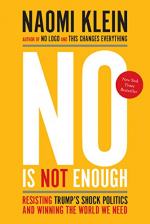|
This section contains 595 words (approx. 2 pages at 400 words per page) |

|
No Is Not Enough Summary & Study Guide Description
No Is Not Enough Summary & Study Guide includes comprehensive information and analysis to help you understand the book. This study guide contains the following sections:
This detailed literature summary also contains Topics for Discussion on No Is Not Enough by Klein, Naomi.
The following version of this book was used to complete this guide: Klein, Naomi. No Is Not Enough: Resisting Trump's Shock Politics and Winning the World We Need. Haymarket Books, 2017.
Contrary to the lengthy and meticulously detailed books of Naomi Klein's past, No Is Not Enough is a brief, emotional plea for a common-sense approach to policy making rooted in the simple premise of caring for one another and caring for the earth. Her professional history as an author and activist specializing in branding and shock politics gives her a unique and insightful perspective into Trump's presidency and his administration, as she believes he is a product of many of the trends she has studied in the past. Klein begins her book with a brief historical recap of how the global community drifted unknowingly to the right as a result of both expertly implemented shock politics and the corrosive culture of branding. Trump grew his gargantuan real estate empire according to the rules of branding - which dictate allegiance only to one’s brand, not to societal values - and among a world infused with shock politics, which is what Klein calls the way governments exploit natural disasters, economic crashes, terrorist attacks, or any other shock to capitalize on a distracted population to push forward oppressive or unpopular policies. These dual forces imposed incremental rightward shifts in policy and discourse that Klein believes lead to the rise of a corporate demagogue like Trump.
After establishing a contextual basis for how we as a nation got here, Klein dissects the professional and personal histories of Trump, his family, and his administration in an attempt to decipher its underlying goals. Klein focuses intently on the inner workings of the current administration not to condemn, but to actively look toward the future. For example, Secretary of State Rex Tillerson's forty-year tenure at Exxon Mobil provides insight into the direction the administration will take on oil policy, and EPA head Scott Pruitt's outright denial of climate change science speaks to the potential future of clean energy. With a comprehensive understanding of the administration, Klein takes her discussion into a more practical realm, where she examines the worst possible outcomes of an unchecked Trump presidency, from war, to an increased likelihood for natural disasters, and an even more unstable economic environment. These shocks can be resisted, however. To highlight this point, Klein offers several examples of past instances when societies cried a loud and reverberating no to exploitation, such as Spaniard's refusal to be scared into joining the invasion of Iraq in 2001. Armed with a collective historical memory of previous instances shocks were exploited, Klein believes the masses have the power to resist.
Klein's obligation to write this framework for a progressive future stems from not only her own professional background, but from a recent collective effort based in Canada that brought thousands of activists, authors, politicians, and concerned citizens together to discuss the intersections of the many problems facing the world today. This effort produced what came to be named the Leap Manifesto, a framework for the future of policy centered around the simple idea of caring for each other and caring for the world. The manifesto does not make specific policy recommendations, but rather, it acts as a moral reference point from which policy can be derived. This moral framework is identical to the one suggested in Klein's book; an intersectional, compassionate, people-based set of values that, if applied both personally and to policy, can win what Klein calls in her title the world we need.
Read more from the Study Guide
|
This section contains 595 words (approx. 2 pages at 400 words per page) |

|



